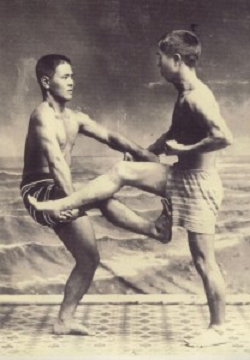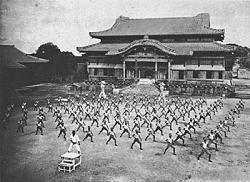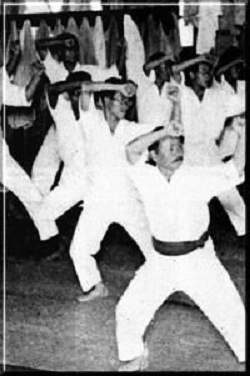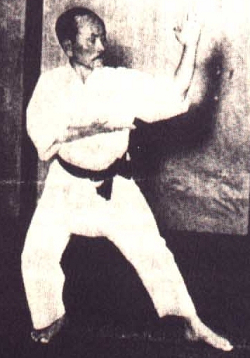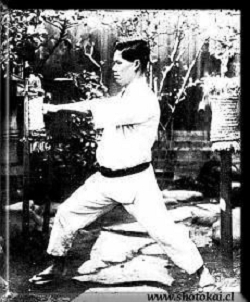Japan Karate Do Hakuak-kai・Shotokan Ryu Karate
TEL.090-4709-4766
Higashi Ryoke 1-11-3 Kawaguchi City Saitamaken Japan

What is Karate Do
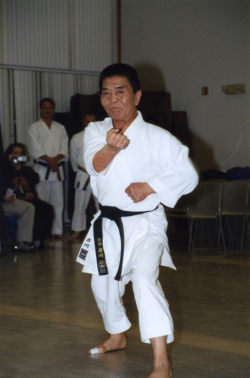 |
WHAT IS KARATE DO Karate Do is [ (空)karate-empty,(手)te-hand,道)do-way ] an empty handed art of self-defense in which the arms and legs are systematically trained and an enemy attacking by surprise can be controlled by a demonstration of strength like that of using actual weapons. Karate do is exercise through which the karateka masters all body movements,such as bending, jumping and balancing,by learning to movelimbs and body backward and forward left and right up and down,freely and uniformly. Training transforms various parts of the body into weapons to be used freely and effectively.The quality necessary to accomplish this is self control. To become a victor,one must first overcome hisown self.The techniques of karate do are controlled acntrolled according to the karateka's will power and are directed at the target accurately and spontaneously. |
|
| Deciding who is the winner and who is the loser is not the ultimate objective.Karate do is a martial art for the development of character through training ,so that the karateka can surmount any obstacle, tangible or intangible. | ||
WHAT IS KARATE DO
What is Karate-DoIn Okinawa, a miraculous and mysterious martial art has come down to us from the past. It is said that one who masters its techniques can defend himself readily without resort to weapons and can perform remarkable feats: the breaking of several thick boards with his fist or ceiling panels of a room with a kick. With his shuto ("sword hand") he can kill a bull with a single stroke; he can pierce the flank of a horse with his open hand; he can cross a room grasping the beams of the ceiling with his fingers, crush a green bamboo stalk with his bare hand, shear a hemp rope with a twist, or gouge soft rock with his hands.
Some consider these aspects of this miraculous and mysterious martial art to be the essence of Karate-do. But such feats are a small part of karate, playing a role analogous to the straw-cutting test of kendo [Japanese fencing], and it is erroneous to think that there is no more to Karate-do than this. In fact, true Karate-do places weight upon spiritual rather than physical matters, as we shall discuss. True Karate-do is this: that in daily life, one's mind and body be trained and developed in a spirit of humility; and that in critical times, one be devoted utterly to the cause of justice.
KARA(空)
Karate-do is a martial art peculiar to Okinawa in its origins. Although it has in the past tended to be confused with Chinese boxing because of the use of the chinese "kara" character in its earlier name, in fact for the past thousand years, the study and practice of masters and experts, through which it was nurtured and perfected and formed into the unified martial art that it is today, took place in Okinawa. It is, therefore, not a distortion to represent it as an Okinawan martial art.
One may ask why the chinese "kara" character has been retained for so long. As I discuss in the section "The Development of Karate-do," I believe that at the time the influence of Chinese culture was at its peak in Japan, many experts in the martial arts traveled to China to practice Chinese boxing. With their new knowledge, they altered the existing martial art, called Okinawa-te, weeding out its bad points and adding good points to it, thus working it into an elegant art. It may be speculated that they considered "kara" (with the chinese character) an appropriate new name. Since, even in contemporary Japan, there are many people who are impressed by anything that is foreign, it is not difficult to imagine the high regard for anything Chinese that prevailed during that period in Okinawa. Even at the time of the present writer's youth, lack of a full set of Chinese furniture and furnishings in one's home was a serious impediment to the social influence of any leading family. With this background, the reason for the choice of the chinese "kara" character, meaning "Chinese," as a simple case of exoticism is apparent.
Following tradition, the writer has in the past continued to use the chinese character. However, because of the frequent confusion with Chinese boxing, and the fact that the Okinawan martial art may now be considered a Japanese martial art, it is inappropriate, and in a sense degrading, to continue use of the old "kara" in the name. For this reason, in spite of many protests, we have abandoned the use of it to replace it with the new character "kara".
WHAT IS THE MEANING OF KARA
The first connotation of kara indicates that karate is a technique that permits one to defend himself with his bare hands and fists without weapons.
Second, just as it is the clear mirror that reflects without distortion, or the quiet valley that echoes a sound, so must one who would study Karate-do purge himself of selfish and evil thoughts, for only with a clear mind and conscience can he understand that which he receives. This is another meaning of the element kara in Karate-do.
Next, he who would study Karate-do must always strive to be inwardly humble and outwardly gentle. However, once he has decided to stand up for the cause of justice, then he must have the courage expressed in the saying, "Even if it must be ten million foes, I go!" Thus, he is like the green bamboo stalk: hollow (kara) inside, straight, and with knots, that is, unselfish, gentle, and moderate. This meaning is also contained in the element kara of Karate-do.
The first one is the least subtle and the most straightforward, through the practice of karate, self defense techniques are learnt, where no weapons are needed, other than hands, feet or other parts of the body. Secondly, and in the words of Master Funakoshi: "Just as it is the clear mirror that reflects without distortion, or the quiet valley that echoes a sound, so must one who would study Karate-do purge himself of selfish and evil thoughts, for only with a clear mind and conscience can he [she] understand that which he [she] receives. This is another meaning of the element kara in Karate-do." Another meaning given by the Master is that of always striving to be inwardly humble and outwardly gentle, thus meaning a internal emptiness of egoism and acting gently and moderately. Finally he talks about the elemental form of the Universe, which is emptiness (kara, ku), "and thus, emptiness is form itself. The kara of Karate-do has this meaning."
After what's been said, it is clear that Karate-do and Karate Budo are much, much more than mere self-defense techniques, actually, such a definition is a far shot from the real essence of Karate as a philosophy, which strives to develop the inner qualities of a human being and the search of perfection of your character, through strenuous training in the do and budo martial arts.
But speculating is not the way of ending an article on the great Gichin Funakoshi. One thing is sure, he is, and always will be, an inspiration for all the Shotokan karatekas. His legacy is with us in every basic technique, every leg technique, in the Kata, in the different kumite trainings, his influence lives with us and within us every day through our Karate.
Today, the young karate-ka who will be the leaders in the 21st century are boldly challenging national tournaments and world championships, and constantly topping the list of winners.
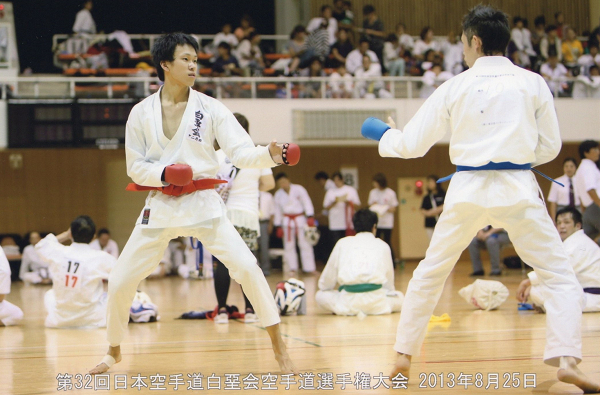
TEL. 090-4709-4766
Email : hakuakai_mail@yahoo.co.jp
Email : agalawatta1_29@yahoo.co.jp
Japan Karate Do Hakua-kai

